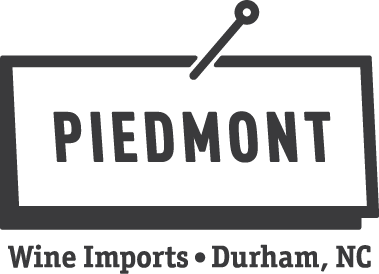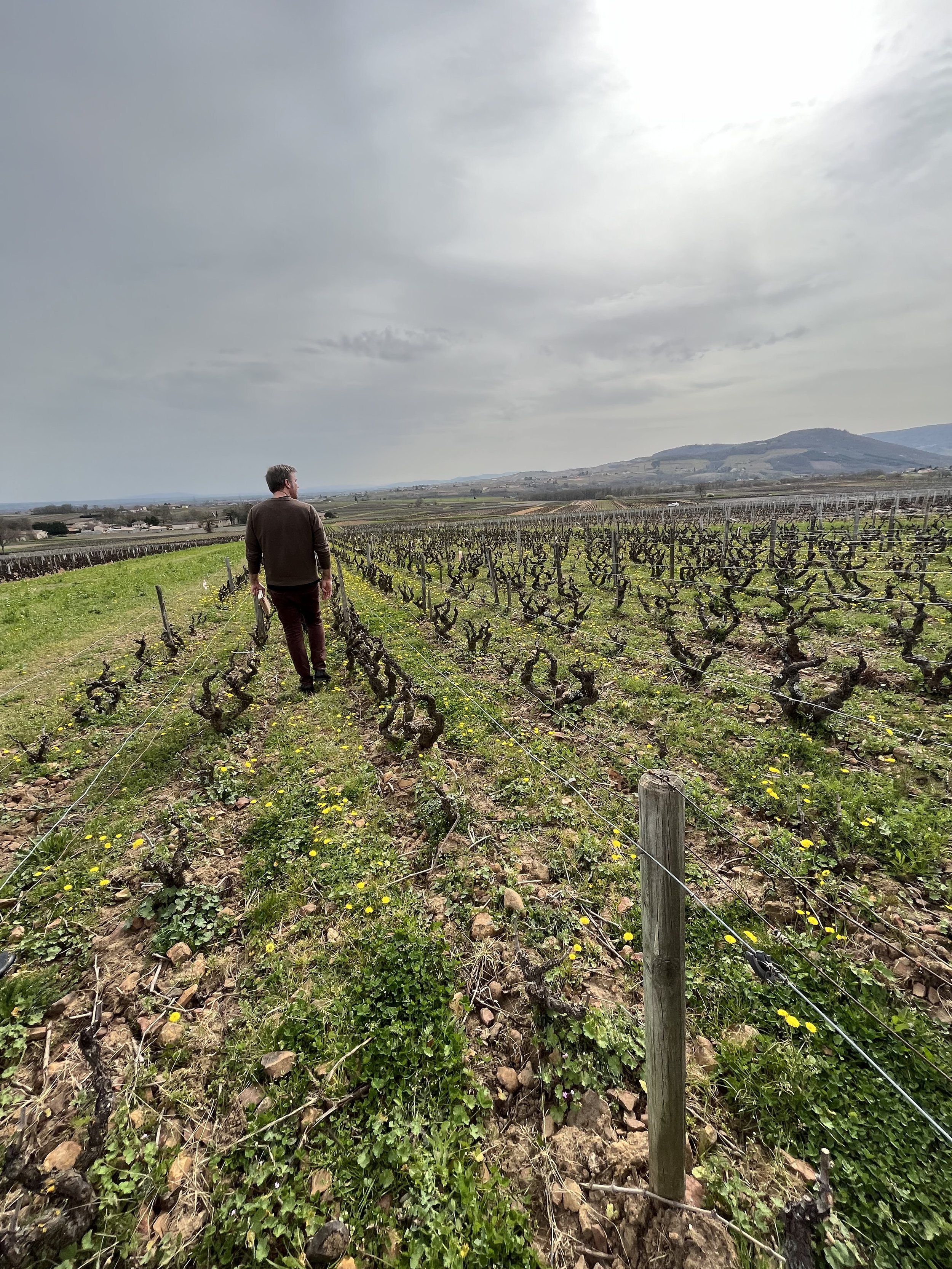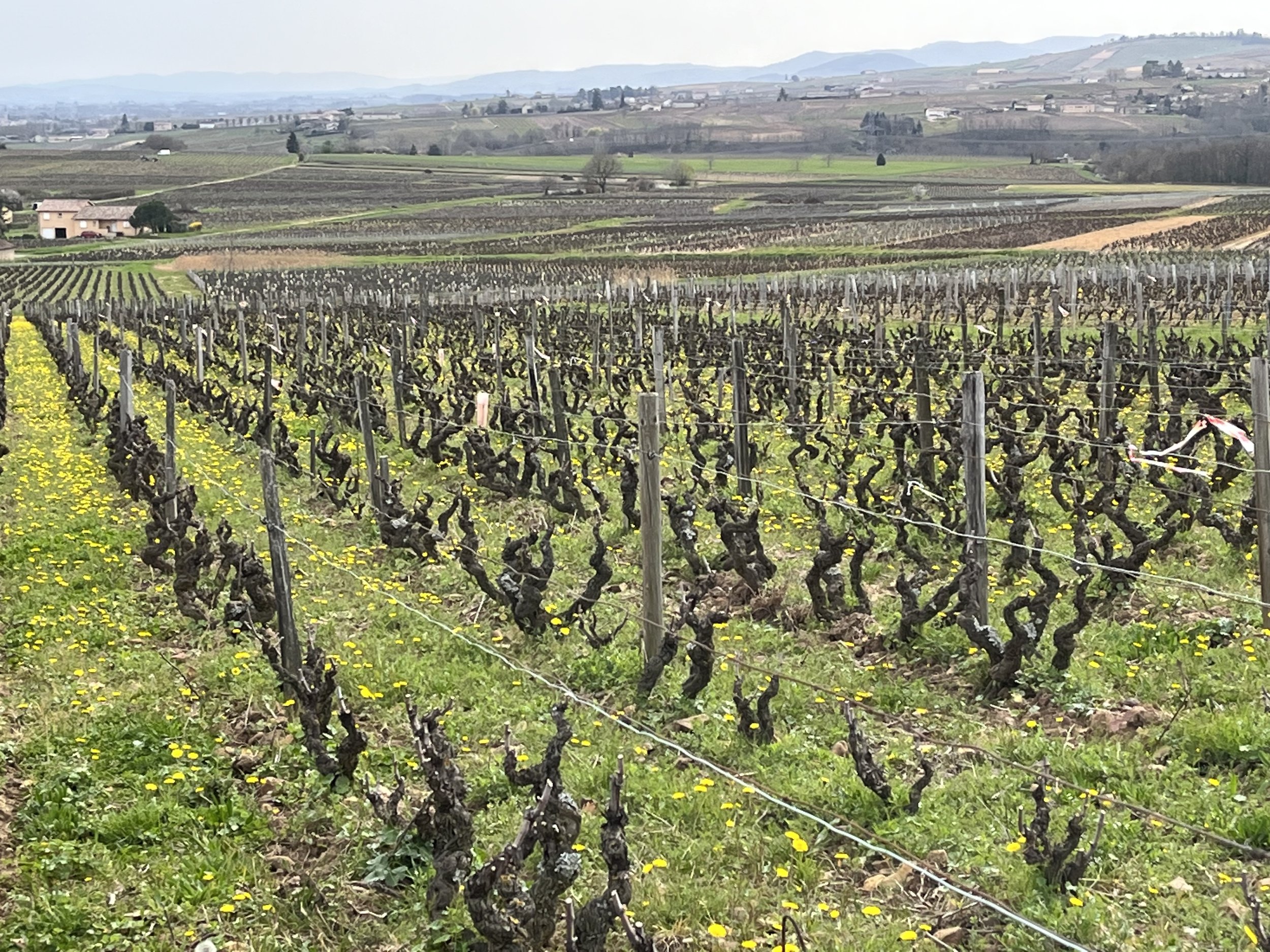Vignes du Paradis March 2023: Visiting Pascal Durand
I won’t improve my French in the years ahead. It’s unrealistic. I’m averaging one trip to France every three years. More excursions are likely, but French will remain my fourth-favorite way to communicate for the foreseeable future.
Pascal uses a pipette to grab us some Gamay.
Email is a godsend. When I arrived, I knew Pascal would be at lunch in the restaurant next to his winery in St. Amour-Bellevue. It was springtime, but before budbreak. He was on farmer time. It was 3pm. Coffee was being served, and an alarmingly green distillate that resembled creme de menthe. The restaurant was emptying out. Soon it was us, Pascal’s lunch buddies, an aged Jack Russell terrier, and the proprietress. Kitchen staff drifted out to share cigarettes. The back patio was unseasonably warm. Nobody was in a hurry.
I was the external force pressing Pascal back to his tiny cellar. Making the poor guy work during siesta, trying not to tap my foot. Also, I had no reason to be in a rush. Simple excitement at seeing a domaine that I hadn’t visited since 2019 was pushing me along. But French farmer lunch inertia is strong. So we sat for a while. Lucien the terrier found some shade between plants and legs.
An anglophone friend sitting between Pascal and I facilitated halting conversation. Tiny cups emptied, wisps of smoke drifted away. We went next door. A considerably more animated Jack Russell terrier greeted us at the gate to Domaine du Paradis. A puppy, capable of chasing a tennis ball for the duration of a cellar tour and wine tasting. Pascal’s cellar is two rooms. One contains a century-old massive wooden press that crushes all the Gamay that Durand harvests from four hectares of vines. The other room is full of pictures of Pascal as a young man, newspaper clippings, awards, bric-a-brac. A stack of 5-liter bag-in-boxes guards the door. It’s cozy. A red concrete tank crowds into the tasting space. Pascal steals a sample of the 2022 St. Amour that is stored in this large vessel.
Tasting at Vignes du Paradis is a simple affair. There’s a Bourgogne Blanc and a St. Amour, and occasionally a Beaujolais-Villages, depending on the vintage. At a tiny working farm like this, few bottles are kept from previous vintages. The wine has to be sold.
Pascal’s parents live in a house adjacent to the cellar, sharing the small brick courtyard. His residence seems to be next door. The Durand compound is space-efficient. They are in the center of the village of St. Amour Bellevue, which amounts to one short street, two restaurants, and a lot of kitschy heart motifs. One of the restaurants is named “le 2-14er” or something similar. We didn’t visit that one.
After tasting, we drove a few hundred meters to “en Paradis” a favorable lieu dit/climat of St. Amour where Pascal has two .5 hectare parcels of vines. He farms without herbicides. In fact, starting with the 2022 vintage, the wines of Domaine du Paradis are certified organic. It’s easy to see the difference en Paradis. As we amble through Pascal’s half-century old low-trained Gamay bush vines, he discusses the character of a dozen flowers, legumes, and grasses growing between the trunks. At a not-too-distant conventionally farmed parcel belonging to a neighbor, there is nothing but red earth. Not a speck of green to be seen. Pascal explains that people are afraid the natural vegetation will drink up scant rainwater. It has been a dry season. But green vegetative cover not only nourishes the soil, it also traps moisture/humidity. The fear of drought that motivates conventional farmers to poison plants and expose bare soil/rock is perhaps counterproductive. Without humus, evaporation is swift.
Not to mention the microbiome. “The earthworm is the elephant of the soil.” Pascal's statement is funny, and filled with farmer logic. Worms keep soil porous. Their digestive process fuels healthy microbial life in a vineyard. Synthetic herbicides and pesticides decimate earthwork populations.
From en Paradis we looked out at a broad panorama of continuous vineyard space. Moulin-a-Vent’s namesake windmill is visible on the horizon. Julienas is nearby. Pascal is in his element. Quiet in both restaurant and cellar, he became expansive while describing the character of the land that surrounded us. A mix of limestone and granite en Paradis, more limestone to the north (Macon is all around us) and more uniformly granite to the south.
It’s time to return to our cars. Bumping along the vineyard road, I mulled the profound agricultural knowledge Pascal attempted to convey during our walk. With the help of Google Translate and a plant identification app on his phone, we spoke of the minutiae of his farm life. A short drive and I’m in Pouilly-Fuisse. Things begin to shift. Cultural changes that occur in the space of scant kilometers feel fundamentally European to me. I’m glad places maintain strong coexisting identities. Long histories and distinct viticultural traditions line these circuitous D-roads. Domaine du Paradis is at the ideal distance from the limelight. Neither hinterland nor vine disneyland, scrubbed clean of character by money and tourism. The sincerity of Pascal’s father’s expression as we pulled away from the cellar door taught me that a visit from an American importer is still truly meaningful at this address. French villagers, speaking solely French, living fundamentally unchanged lives. I wonder what they’d make of Cru Beaujolais prices in America these days. Probably best to spare them the sticker shock.



